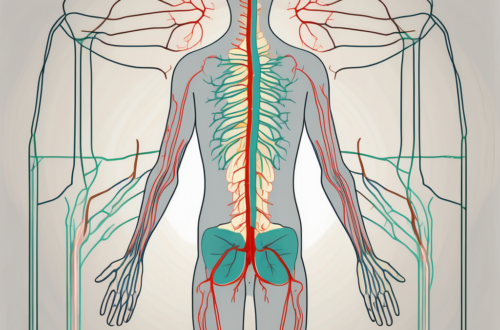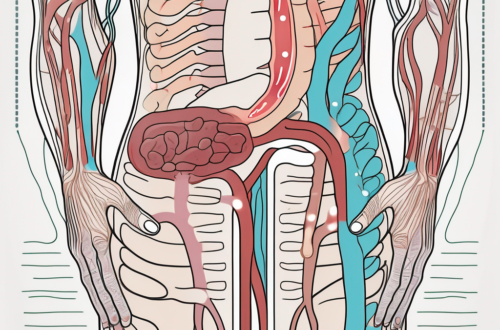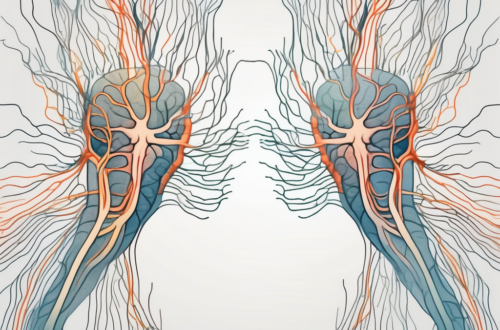The parasympathetic nervous system plays a crucial role in regulating various bodily functions, and understanding its effects is essential for maintaining optimal health and well-being. In this article, we will delve into the basics of the parasympathetic nervous system, explore the science behind nerve regulation, take a closer look at how parasympathetic nerve regulation works, examine the effects it has on the body, and discuss its implications for overall health. Let us begin by understanding the fundamentals of the parasympathetic nervous system.
The Basics of the Parasympathetic Nervous System
Defining the Parasympathetic Nervous System
The parasympathetic nervous system is one of the two divisions of the autonomic nervous system, working in conjunction with the sympathetic nervous system. Unlike the sympathetic nervous system, which is responsible for the “fight or flight” response, the parasympathetic nervous system prompts the body to rest, relax, and digest.
The parasympathetic nervous system is a crucial component of the autonomic nervous system, which controls involuntary bodily functions. It consists of a network of nerves that originate from the cranial and sacral regions of the spinal cord. These nerves extend to various organs and tissues throughout the body, allowing the parasympathetic nervous system to exert its influence.
Role and Function of the Parasympathetic Nervous System
When the parasympathetic nervous system is activated, it stimulates various bodily functions, such as slowing the heart rate, increasing digestive activity, and promoting relaxation. This division of the autonomic nervous system is responsible for maintaining homeostasis in the body by counteracting the effects of the sympathetic nervous system.
One of the primary functions of the parasympathetic nervous system is to regulate the heart rate. When activated, it releases neurotransmitters that bind to specific receptors in the heart, causing the heart rate to slow down. This decrease in heart rate allows the body to conserve energy and promotes a state of relaxation.
In addition to regulating the heart rate, the parasympathetic nervous system also plays a vital role in digestion. It stimulates the production of digestive enzymes and increases blood flow to the digestive organs, promoting optimal digestion and absorption of nutrients. This is why it is often referred to as the “rest and digest” system.
Furthermore, the parasympathetic nervous system is involved in various other bodily functions, such as constricting the pupils, promoting salivation, and stimulating bladder contraction for urination. These actions help maintain the overall balance and well-being of the body.
Overall, the parasympathetic nervous system acts as a counterbalance to the sympathetic nervous system, ensuring that the body remains in a state of equilibrium. While the sympathetic nervous system prepares the body for intense physical activity or a perceived threat, the parasympathetic nervous system restores calmness and allows the body to recover and rejuvenate.
The Science of Nerve Regulation
Nerve regulation is a fascinating and intricate process that plays a crucial role in the functioning of our bodies. It involves the transmission of signals between nerve cells, known as neurons, which are spread throughout our entire body. These neurons work together to ensure that our bodily functions are properly regulated and coordinated.
The Process of Nerve Regulation
At the core of nerve regulation is the parasympathetic nervous system, which is responsible for maintaining a state of rest and relaxation in our bodies. This system utilizes a complex network of neurotransmitters, such as acetylcholine, to transmit messages between neurons. These neurotransmitters act as chemical messengers, allowing for precise and efficient communication between different parts of our body.
When a signal needs to be transmitted, it begins with an electrical impulse generated by a neuron. This impulse travels along the length of the neuron, known as an axon, until it reaches the end. At the end of the axon, there are small structures called synapses, which are responsible for transmitting the signal to the next neuron in line.
Once the electrical impulse reaches the synapse, it triggers the release of neurotransmitters into the synaptic gap, a small space between the two neurons. These neurotransmitters then bind to receptors on the receiving neuron, allowing the signal to be transmitted and continue its journey throughout the body.
It’s important to note that nerve regulation is not a one-way street. It involves a constant back-and-forth communication between neurons, allowing for the coordination of various bodily functions. This intricate dance of signals ensures that our heart rate, digestion, respiratory function, and many other processes are working harmoniously.
The Importance of Nerve Regulation in the Body
Nerve regulation is absolutely vital for maintaining a healthy balance in our bodies. It ensures that our physiological processes are functioning optimally, allowing us to live our lives to the fullest.
For example, let’s consider the regulation of heart rate. Our heart beats rhythmically, pumping blood throughout our body to deliver oxygen and nutrients to our cells. This rhythmic beating is controlled by the autonomic nervous system, which includes the parasympathetic nervous system responsible for nerve regulation. Through the precise coordination of signals, our heart rate can adjust to meet the demands of our body, whether we’re resting or engaging in physical activity.
Similarly, nerve regulation is crucial for proper digestion. The parasympathetic nervous system helps to stimulate the release of digestive enzymes and increase blood flow to the digestive organs, ensuring that food is broken down and absorbed efficiently. Without this regulation, digestive issues such as indigestion or malabsorption can occur, leading to discomfort and nutrient deficiencies.
Furthermore, nerve regulation plays a significant role in respiratory function. The parasympathetic nervous system helps to control the smooth muscles in our airways, ensuring that they remain open and allowing for proper airflow. This regulation ensures that our body receives the oxygen it needs and removes carbon dioxide effectively, supporting overall respiratory health.
Disruptions in nerve regulation can have profound effects on our health. Conditions such as autonomic dysfunction or neuropathy can arise, leading to symptoms such as irregular heart rate, digestive problems, or difficulty breathing. Understanding the intricacies of nerve regulation is crucial for diagnosing and treating these conditions, as well as developing new therapies to restore balance.
In conclusion, nerve regulation is a complex and vital process that allows our bodies to function optimally. Through the transmission of signals between neurons, the parasympathetic nervous system ensures that our physiological processes, such as heart rate, digestion, and respiratory function, are regulated with precision. Understanding the science behind nerve regulation is not only fascinating but also essential for maintaining our overall health and well-being.
Parasympathetic Nerve Regulation: A Closer Look
How Parasympathetic Nerve Regulation Works
Parasympathetic nerve regulation involves a complex interplay between the brain, spinal cord, and peripheral nerves. This intricate network of communication allows the body to maintain a delicate balance between rest and activity. When the body detects a need for rest and relaxation, the parasympathetic division activates, causing a cascade of events that lead to decreased heart rate, increased activity in the digestive system, and a sensation of calmness.
Let’s dive deeper into the fascinating process of parasympathetic nerve regulation. When the brain perceives a state of relaxation, it sends signals through the spinal cord to the peripheral nerves. These peripheral nerves, which are spread throughout the body, act as messengers, transmitting the brain’s instructions to the target organs and tissues.
One of the key players in parasympathetic nerve regulation is the vagus nerve. This remarkable nerve originates in the brainstem and extends down to various organs, including the heart, lungs, and digestive system. The vagus nerve acts as a major pathway for parasympathetic signals, allowing for precise control over bodily functions.
Once the parasympathetic signals reach their destination, they initiate a series of responses that promote rest and relaxation. For example, in the heart, parasympathetic stimulation leads to a decrease in heart rate. This reduction in heart rate helps conserve energy and promotes a state of calmness. Similarly, in the digestive system, parasympathetic activation enhances the secretion of digestive enzymes, increases blood flow to the intestines, and promotes smooth muscle contractions, known as peristalsis, which aid in digestion.
The Impact of Parasympathetic Nerve Regulation on Body Functions
Parasympathetic nerve regulation profoundly affects various body functions, playing a vital role in maintaining overall health and well-being. One of its primary functions is to promote digestion. When the parasympathetic division is activated, it increases saliva production, which helps initiate the process of breaking down food. Additionally, parasympathetic stimulation stimulates the release of digestive enzymes, which further aids in the digestion and absorption of nutrients. The increased blood flow to the intestines during parasympathetic activation ensures that the digestive system receives the necessary oxygen and nutrients to carry out its functions efficiently.
Moreover, parasympathetic nerve regulation is crucial for maintaining cardiovascular health. By regulating heart rate, the parasympathetic division helps ensure that the heart beats at an appropriate pace, allowing for efficient blood circulation. This regulation also helps maintain stable blood pressure, preventing sudden spikes or drops that could potentially have detrimental effects on the body.
In addition to its impact on digestion and cardiovascular function, parasympathetic nerve regulation influences other body processes as well. It plays a role in regulating respiratory rate, ensuring that the body receives an adequate supply of oxygen. Furthermore, parasympathetic activation promotes relaxation and reduces stress levels, which can have a positive impact on mental health and overall well-being.
Overall, parasympathetic nerve regulation is a fascinating and intricate process that involves the coordination of various organs, nerves, and physiological responses. Understanding the mechanisms behind this regulation provides valuable insights into how our bodies maintain balance and adapt to different situations. By appreciating the complexity of parasympathetic nerve regulation, we can gain a deeper appreciation for the remarkable intricacies of the human body.
Effects of Parasympathetic Nerve Regulation
The effects of parasympathetic nerve regulation are not only essential for overall well-being but also diverse in nature. This regulatory system plays a crucial role in maintaining the body’s equilibrium by reducing heart rate and blood pressure, thereby conserving energy and preventing cardiovascular strain. By doing so, it ensures that the body functions optimally and efficiently.
Physical Effects of Parasympathetic Nerve Regulation
One of the primary physical effects of parasympathetic nerve regulation is its impact on digestion. This regulatory system aids in the smooth functioning of the digestive system, allowing the body to absorb nutrients efficiently and eliminate waste effectively. It ensures that the body receives the necessary nourishment and maintains a healthy gastrointestinal tract.
In addition to its role in digestion, parasympathetic nerve regulation also influences various other bodily functions. It helps regulate the constriction and dilation of blood vessels, ensuring proper blood flow throughout the body. This, in turn, contributes to maintaining optimal blood pressure levels and overall cardiovascular health.
Furthermore, this regulatory system plays a crucial role in promoting the relaxation of smooth muscles in the body. By doing so, it helps in reducing muscle tension and promoting a sense of calmness. This relaxation response is essential for overall physical well-being and can contribute to the prevention of muscle-related issues such as spasms and cramps.
Psychological Effects of Parasympathetic Nerve Regulation
Parasympathetic nerve regulation not only has significant physical effects but also profound psychological impacts. By promoting a state of relaxation and calmness, it helps alleviate stress and anxiety. This regulatory system acts as a counterbalance to the sympathetic “fight or flight” response, allowing individuals to experience a sense of peace and tranquility.
In addition to reducing stress and anxiety, parasympathetic nerve regulation also plays a crucial role in promoting better sleep. By activating the relaxation response, it helps individuals fall asleep faster and achieve a more restful sleep. This, in turn, contributes to improved cognitive function, mood regulation, and overall mental well-being.
Moreover, this regulatory system is also involved in regulating various cognitive processes. It influences attention, memory, and learning, allowing individuals to focus and retain information effectively. By maintaining a balance between the sympathetic and parasympathetic systems, it ensures optimal cognitive functioning.
In conclusion, parasympathetic nerve regulation has a wide range of effects on both the physical and psychological aspects of an individual’s well-being. From promoting digestion and cardiovascular health to reducing stress and anxiety, this regulatory system plays a vital role in maintaining overall equilibrium and ensuring optimal functioning of the body and mind.
The Parasympathetic Nervous System and Health
The parasympathetic nervous system plays a crucial role in maintaining overall health and well-being. It is responsible for regulating various bodily functions, including heart rate, digestion, and relaxation. Understanding the importance of the parasympathetic nervous system can help individuals make informed decisions about their health and take steps to support its optimal functioning.
Parasympathetic Nervous System Disorders
Disruptions in the parasympathetic nervous system can lead to various disorders. One common disorder is bradycardia, which refers to a slow heart rate. When the parasympathetic division is not functioning optimally, it can cause the heart to beat too slowly, leading to symptoms such as fatigue, dizziness, and fainting. Another disorder associated with parasympathetic dysfunction is constipation. The parasympathetic nervous system helps regulate bowel movements, and when it is not working properly, it can result in difficulty passing stools. Gastroesophageal reflux disease (GERD) is another condition that can occur when the parasympathetic nervous system is disrupted. It causes acid from the stomach to flow back into the esophagus, leading to heartburn, chest pain, and difficulty swallowing.
If you suspect any issues related to parasympathetic nerve regulation, it is important to consult with a healthcare professional for an accurate diagnosis and appropriate treatment. They can evaluate your symptoms, conduct tests if necessary, and recommend a treatment plan tailored to your specific needs. Early intervention and management of parasympathetic nervous system disorders can help alleviate symptoms and improve overall quality of life.
The Role of Parasympathetic Nerve Regulation in Health and Disease
Understanding the effects of parasympathetic nerve regulation is essential for maintaining optimal health and preventing illness. The parasympathetic nervous system promotes a state of rest and relaxation, allowing the body to recover and regenerate. By adopting lifestyle practices that promote relaxation and support the parasympathetic nervous system, individuals can enhance their overall well-being.
Engaging in stress-reducing activities can have a positive impact on the parasympathetic nervous system. Activities such as yoga, meditation, deep breathing exercises, and spending time in nature can help activate the parasympathetic response, reducing stress levels and promoting a sense of calm and tranquility. Practicing mindfulness, which involves being fully present in the moment and non-judgmentally aware of one’s thoughts and feelings, can also support parasympathetic nerve regulation.
Another important aspect of supporting the parasympathetic nervous system is getting sufficient rest. Sleep plays a vital role in regulating the body’s overall functioning, including the parasympathetic response. Lack of sleep can disrupt the balance between the sympathetic and parasympathetic nervous systems, leading to increased stress levels and decreased overall well-being. Therefore, prioritizing quality sleep and establishing a regular sleep routine can help support the parasympathetic nervous system.
However, it is crucial to consult with a healthcare professional before implementing any significant changes to ensure personalized care. They can provide guidance on lifestyle modifications, recommend appropriate relaxation techniques, and address any underlying health conditions that may be affecting the parasympathetic nervous system.
In conclusion, the parasympathetic nervous system plays a vital role in maintaining optimal health. Understanding its function and the potential disorders that can arise from its dysfunction can help individuals take proactive steps to support its proper functioning. By adopting a holistic approach that includes stress reduction, mindfulness, and adequate rest, individuals can enhance their overall well-being and promote the health of their parasympathetic nervous system.
Future Research Directions in Parasympathetic Nerve Regulation
Current Challenges in Understanding Parasympathetic Nerve Regulation
While significant progress has been made in understanding the effects of parasympathetic nerve regulation, there are still challenges to overcome. Further research is needed to gain a comprehensive understanding of the molecular mechanisms involved in the regulation of parasympathetic activity and its implications for health and disease.
Potential Areas for Future Research
Potential areas for future research include investigating the impact of parasympathetic nerve regulation on specific health conditions, exploring novel therapeutic approaches that target parasympathetic function, and examining the interplay between the parasympathetic and sympathetic nervous systems in various physiological processes.
Conclusion
In conclusion, understanding the effects of parasympathetic nerve regulation is crucial for maintaining optimal health and well-being. By appreciating the role of the parasympathetic nervous system in regulating bodily functions, we can adopt lifestyle practices that support its function and promote overall balance. However, it is important to emphasize the need for individualized care and consultation with healthcare professionals for accurate diagnosis, treatment, and advice in maintaining optimal parasympathetic nerve regulation.





